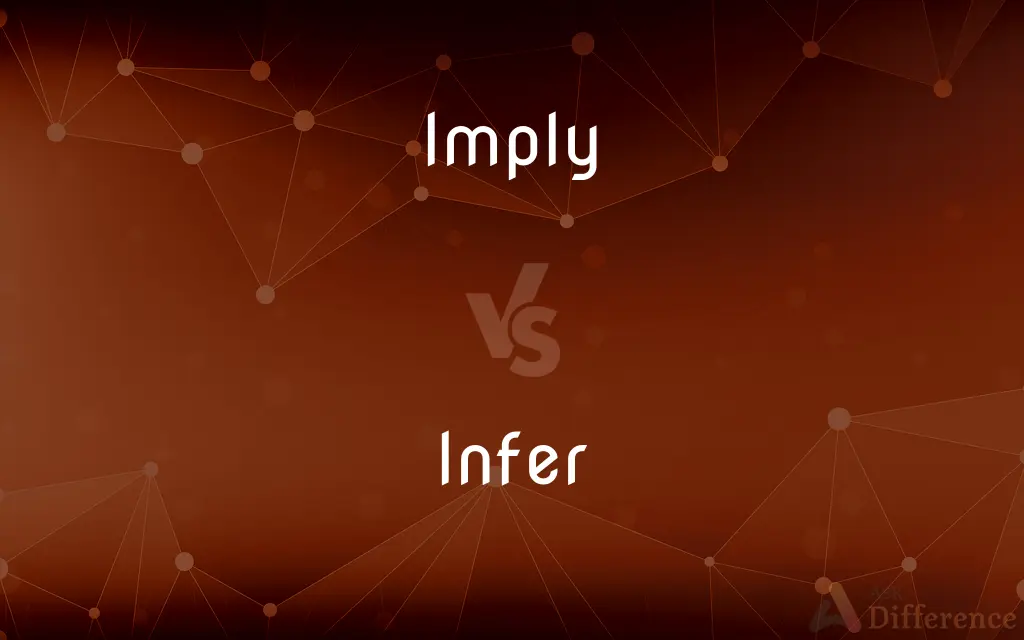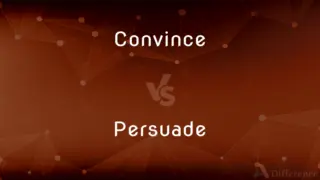Imply vs. Infer — What's the Difference?
By Tayyaba Rehman — Updated on October 5, 2023
To imply is to suggest without stating directly. To infer is to deduce or conclude from evidence or reasoning.

Difference Between Imply and Infer
Table of Contents
ADVERTISEMENT
Key Differences
Imply and Infer are terms frequently utilized in communication, but they serve distinctly different purposes. When one implies, they are indirectly indicating or suggesting something without expressing it straightforwardly. In contrast, to infer means to deduce or draw a conclusion based on what has been presented or observed.
An easy way to differentiate between imply and infer is to understand their positions in communication. Imply is often the role of the speaker or writer. It's what they hint at or insinuate. Infer, on the other hand, is the job of the listener or reader. It's about understanding or deducing the underlying meaning of what's being said.
Mistaking imply for infer (or vice versa) can lead to misunderstandings in dialogue. If a speaker implies something, they're leaving room for interpretation. However, what one person infers can differ from what another person understands, based on their perspectives and experiences.
Consider this scenario: A colleague might imply they're overwhelmed by saying they've had a busy week. Another colleague might infer from this statement that assistance might be needed with workload. Here, imply is the act of hinting, and infer is the act of deducing the underlying message.
At their core, both imply and infer revolve around nuances and indirect information. While imply deals with delivering these nuances, infer pertains to receiving and interpreting them.
ADVERTISEMENT
Comparison Chart
Definition
To suggest without stating directly.
To deduce from evidence or reasoning.
Role in Communication
Sender's action (speaker/writer).
Receiver's action (listener/reader).
Usage Example
"Are you implying I made a mistake?"
"From his tone, I inferred he was upset."
Part of Speech
Verb
Verb
Common Confusion
Mistakenly used when intending to suggest.
Often misused in place of "imply."
Compare with Definitions
Imply
To indicate or suggest without being explicitly stated.
Her silence seemed to imply that she disagreed.
Infer
To bring in as a deduced result.
From these facts, we can infer that crime has been decreasing.
Imply
To express indirectly.
He implied that he wasn't ready to commit.
Infer
To guess; speculate; surmise.
From the look on her face, I inferred she knew the secret.
Imply
To express or state indirectly
She implied that she was in a hurry.
Infer
To derive as a conclusion from facts or premises.
We inferred his sincerity from his tone.
Imply
To make evident indirectly
His fine clothes implied that he was wealthy. See Usage Note at infer.
Infer
To conclude from evidence or by reasoning
"For many years the cerebral localization of all higher cognitive processes could be inferred only from the effects of brain injuries on the people who survived them" (Sally E. Shaywitz).
Imply
To involve by logical necessity; entail
Life implies growth and death.
Infer
To involve by logical necessity; entail
"Socrates argued that a statue inferred the existence of a sculptor" (Academy).
Imply
To have as a necessary consequence
The proposition that "all dogs are mammals" implies that my dog is a mammal.
Infer
(Usage Problem) To indicate indirectly; imply.
Imply
To suggest by logical inference
When I state that your dog is brown, I am not implying that all dogs are brown.
Infer
To draw inferences.
Imply
To hint; to insinuate; to suggest tacitly and avoid a direct statement
What do you mean "we need to be more careful with hygiene"? Are you implying that I don't wash my hands?
Infer
(transitive) To introduce (something) as a reasoned conclusion; to conclude by reasoning or deduction, as from premises or evidence.
Imply
(archaic) to enfold, entangle.
Infer
To lead to (something) as a consequence; to imply.
Imply
To infold or involve; to wrap up.
Infer
(obsolete) To cause, inflict (something) upon or to someone.
Imply
To involve in substance or essence, or by fair inference, or by construction of law, when not include virtually; as, war implies fighting.
Where a malicious act is proved, a malicious intention is implied.
When a man employs a laborer to work for him, . . . the act of hiring implies an obligation and a promise that he shall pay him a reasonable reward for his services.
Infer
(obsolete) To introduce (a subject) in speaking, writing etc.; to bring in, to adduce.
Imply
To refer, ascribe, or attribute.
Whence might this distaste arise?
If [from] neither your perverse and peevish will.To which I most imply it.
Infer
To bring on; to induce; to occasion.
Imply
Express or state indirectly
Infer
To offer, as violence.
Imply
Suggest as a logically necessary consequence; in logic
Infer
To bring forward, or employ as an argument; to adduce; to allege; to offer.
Full well hath Clifford played the orator,Inferring arguments of mighty force.
Imply
Have as a logical consequence;
The water shortage means that we have to stop taking long showers
Infer
To derive by deduction or by induction; to conclude or surmise from facts or premises; to accept or derive, as a consequence, conclusion, or probability; as, I inferred his determination from his silence.
To infer is nothing but by virtue of one proposition laid down as true, to draw in another as true.
Such opportunities always infer obligations.
Imply
Suggest that someone is guilty
Infer
To show; to manifest; to prove.
The first part is not the proof of the second, but rather contrariwise, the second inferreth well the first.
This doth infer the zeal I had to see him.
Imply
Have as a necessary feature or consequence; entail;
This decision involves many changes
Infer
Reason by deduction; establish by deduction
Imply
To involve as a necessary circumstance.
Violence implies fear.
Infer
Draw from specific cases for more general cases
Imply
To suggest an inference or conclusion.
The evidence implies his guilt.
Infer
Conclude by reasoning; in logic
Imply
To have as a logical consequence.
The testimony implies his involvement.
Infer
Guess correctly; solve by guessing;
He guessed the right number of beans in the jar and won the prize
Infer
Believe to be the case;
I understand you have no previous experience?
Infer
To make an educated guess based on evidence.
From the data, scientists inferred a shift in climate patterns.
Infer
To reason from circumstance; surmise.
The teacher inferred the student’s satisfaction from his smile.
Common Curiosities
If someone says something ambiguous, who does the inferring?
The listener or reader infers or deduces the meaning from the ambiguous statement.
Can imply and infer be used interchangeably?
No, "imply" is what the speaker does, and "infer" is what the listener does in response.
Can one infer without sufficient evidence?
Yes, but such inferences might be speculative and less reliable.
How does infer differ from guess?
To infer is based on evidence or reasoning, while a guess might not have such a basis.
If a message has multiple interpretations, which is correct?
It depends on context and clarity. What's implied might differ from what's inferred by different individuals.
What does it mean to imply something?
To imply is to suggest or indicate something indirectly without stating it outright.
Why is it important to distinguish between imply and infer?
Clear communication requires understanding roles. Misuse can lead to misunderstandings.
How can I avoid making incorrect inferences?
Seek clarity, ask questions, and consider context to make more accurate inferences.
Can implications be negative?
Yes, depending on context, what's implied can be perceived negatively.
What's a common mistake involving imply and infer?
They're often mistakenly used interchangeably when they have distinct roles in communication.
Does an implication always have to be intentional?
No, sometimes a speaker might unintentionally imply something without realizing it.
Can a single statement have multiple implications?
Yes, depending on context and interpretation, a statement can imply various things.
Are imply and infer synonyms?
No, they are related but have different meanings and roles in communication.
Is the process of inference always conscious?
Not necessarily. Some inferences are intuitive or subconscious based on prior knowledge.
Can a speaker infer something from their own statement?
While unusual, a speaker might reconsider and infer new meanings from their own words upon reflection.
Share Your Discovery

Previous Comparison
Convince vs. Persuade
Next Comparison
Casket vs. CoffinAuthor Spotlight
Written by
Tayyaba RehmanTayyaba Rehman is a distinguished writer, currently serving as a primary contributor to askdifference.com. As a researcher in semantics and etymology, Tayyaba's passion for the complexity of languages and their distinctions has found a perfect home on the platform. Tayyaba delves into the intricacies of language, distinguishing between commonly confused words and phrases, thereby providing clarity for readers worldwide.















































